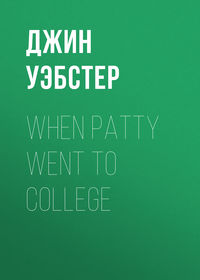 полная версия
полная версияDear Enemy
"Good morning." I smiled affably, and stepped inside. "Is this Mrs. McGurk?"
"It is," said she. "An' ye'll be the new young woman in the orphan asylum?"
"I am that," said I. "Is himself at home?"
"He is not," said she.
"But this is his office hour."
"He don't keep it regular'."
"He ought," said I, sternly. "Kindly tell him that Miss McBride called to consult him, and ask him to look in at the John Grier Home this afternoon."
"Ump'!" grunted Mrs. McGurk, and closed the door so promptly that she shut in the hem of my skirt.
When I told the doctor this afternoon, he shrugged his shoulders, and observed that that was Maggie's gracious way.
"And why do you put up with Maggie?" said I.
"And where would I find any one better?" said he. "Doing the work for a lone man who comes as irregularly to meals as a twenty-four-hour day will permit is no sinecure. She furnishes little sunshine in the home, but she does manage to produce a hot dinner at nine o'clock at night."
Just the same, I am willing to wager that her hot dinners are neither delicious nor well served. She's an inefficient, lazy old termagant, and I know why she doesn't like me. She imagines that I want to steal away the doctor and oust her from a comfortable position, something of a joke, considering. But I am not undeceiving her; it will do the old thing good to worry a little. She may cook him better dinners, and fatten him up a trifle. I understand that fat men are good-natured.
TEN O'CLOCK.
I don't know what silly stuff I have been writing to you off and on all day, between interruptions. It has got to be night at last, and I am too tired to do so much as hold up my head. Your song tells the sad truth, "There is no joy in life but sleep."
I bid you good night.
S. McB.
Isn't the English language absurd? Look at those forty monosyllables in a row!
J. G. H.,
April 1.
Dear Judy:
I have placed out Isador Gutschneider. His new mother is a Swedish woman, fat and smiling, with blue eyes and yellow hair. She chose him out of the whole nurseryful of children because he was the brunettest baby there. She has always loved brunettes, but in her most ambitious dreams has never hoped to have one of her own. His name is going to be changed to Oscar Carlson, after his new dead uncle.
My first trustees' meeting is to occur next Wednesday. I confess that I am not looking forward to it with impatience—especially as an inaugural address by me will be its chief feature. I wish our president were here to back me up! But at least I am sure of one thing. I am never going to adopt the Uriah Heepish attitude toward trustees that characterized Mrs. Lippett's manners. I shall treat "first Wednesdays" as a pleasant social diversion, my day at home, when the friends of the asylum gather for discussion and relaxation; and I shall endeavor not to let our pleasures discommode the orphans. You see how I have taken to heart the unhappy experiences of that little Jerusha.
Your last letter has arrived, and no suggestion in it of traveling North. Isn't it about time that you were turning your faces back toward Fifth Avenue? Hame is hame, be 't ever sae hamely. Don't you marvel at the Scotch that flows so readily from my pen? Since being acquent' wi' Sandy, I hae gathered a muckle new vocabulary. The dinner gong! I leave you, to devote a revivifying half-hour to mutton hash. We eat to live in the John Grier Home.
SIX O'CLOCK.
The Hon. Cy has been calling again. He drops in with great frequency, hoping to catch me IN DELICTU. How I do not like that man! He is a pink, fat, puffy old thing, with a pink, fat, puffy soul. I was in a very cheery, optimistic frame of mind before his arrival, but now I shall do nothing but grumble for the rest of the day.
He deplores all of the useless innovations that I am endeavoring to introduce, such as a cheerful playroom, prettier clothes, baths, and better food and fresh air and play and fun and ice-cream and kisses. He says that I will unfit these children to occupy the position in life that God has called them to occupy.
At that my Irish blood came to the surface, and I told him that if God had planned to make all of these 113 little children into useless, ignorant, unhappy citizens, I was going to fool God! That we weren't educating them out of their class in the least. We were educating them INTO their natural class much more effectually than is done in the average family. We weren't trying to force them into college if they hadn't any brains, as happens with rich men's sons; and we weren't putting them to work at fourteen if they were naturally ambitious, as happens with poor men's sons. We were watching them closely and individually and discovering their level. If our children showed an aptitude to become farm laborers and nurse-maids, we were going to teach them to be the best possible farm laborers and nurse-maids; and if they showed a tendency to become lawyers, we would turn them into honest, intelligent, open-minded lawyers. (He's a lawyer himself, but certainly not an open-minded one.)
He grunted when I had finished my remarks, and stirred his tea vigorously. Whereupon I suggested that perhaps he needed another lump of sugar, and dropped it in, and left him to absorb it.
The only way to deal with trustees is with a firm and steady hand. You have to keep them in their places.
Oh, my dear! that smudge in the corner was caused by Singapore's black tongue. He is trying to send you an affectionate kiss. Poor Sing thinks he's a lap dog—isn't it a tragedy when people mistake their vocations? I myself am not always certain that I was born an orphan asylum superintendent.
Yours, til deth,
S. McB.
SUPERINTENDENT'S OFFICE, JOHN GRIER HOME,
April 4.
THE PENDLETON FAMILY,
Palm Beach, Florida.
Dear Sir and Madam:
I have weathered my first visitors' day, and made the trustees a beautiful speech. Everybody said it was a beautiful speech—even my enemies.
Mr. Gordon Hallock's recent visit was exceptionally opportune; I gleaned from him many suggestions as to how to carry an audience.
"Be funny."—I told about Sadie Kate and a few other cherubs that you don't know.
"Keep it concrete and fitted to the intelligence of your audience."—I watched the Hon. Cy, and never said a thing that he couldn't understand.
"Flatter your hearers."—I hinted delicately that all of these new reforms were due to the wisdom and initiative of our peerless trustees.
"Give it a high moral tone, with a dash of pathos."—I dwelt upon the parentless condition of these little wards of Society. And it was very affecting—my enemy wiped away a tear!
Then I fed them up on chocolate and whipped cream and lemonade and tartar sandwiches, and sent them home, expansive and beaming, but without any appetite for dinner.
I dwell thus at length upon our triumph, in order to create in you a happy frame of mind, before passing to the higeous calamity that so nearly wrecked the occasion.
"Now follows the dim horror of my tale, And I feel I'm growing gradually pale, For, even at this day, Though its smell has passed away, When I venture to remember it, I quail!"You never heard of our little Tammas Kehoe, did you? I simply haven't featured Tammas because he requires so much ink and time and vocabulary. He's a spirited lad, and he follows his dad, a mighty hunter of old—that sounds like more Bab Ballads, but it isn't; I made it up as I went along.
We can't break Tammas of his inherited predatory instincts. He shoots the chickens with bows and arrows and lassoes the pigs and plays bull-fight with the cows—and oh, is very destructive! But his crowning villainy occurred an hour before the trustees' meeting, when we wanted to be so clean and sweet and engaging.
It seems that he had stolen the rat trap from the oat bin, and had set it up in the wood lot, and yesterday morning was so fortunate as to catch a fine big skunk.
Singapore was the first to report the discovery. He returned to the house and rolled on the rugs in a frenzy of remorse over his part of the business. While our attention was occupied with Sing, Tammas was busily skinning his prey in the seclusion of the woodshed. He buttoned the pelt inside his jacket, conveyed it by a devious route through the length of this building, and concealed it under his bed where he thought it wouldn't be found.
Then he went—per schedule—to the basement to help freeze the ice-cream for our guests. You notice that we omitted ice-cream from the menu.
In the short time that remained we created all the counter-irritation that was possible. Noah (negro furnace man) started smudge fires at intervals about the grounds. Cook waved a shovelful of burning coffee through the house. Betsy sprinkled the corridors with ammonia. Miss Snaith daintily treated the rugs with violet water. I sent an emergency call to the doctor who came and mixed a gigantic solution of chlorid of lime. But still, above and beneath and through every other odor, the unlaid ghost of Tammas's victim cried for vengeance.
The first business that came up at the meeting, was whether we should dig a hole and bury, not only Tammas, but the whole main building. You can see with what finesse I carried off the shocking event, when I tell you that the Hon. Cy went home chuckling over a funny story, instead of grumbling at the new superintendent's inability to manage boys.
We've our ain bit weird to dree!
As ever,
S. McBRIDE.
THE JOHN GRIER HOME,
Friday, likewise Saturday.
Dear Judy:
Singapore is still living in the carriage house, and receiving a daily carbolic-scented bath from Tammas Kehoe. I am hoping that some day, in the distant future, my darling will be fit to return.
You will be pleased to hear that I have instituted a new method of spending your money. We are henceforth to buy a part of our shoes and drygoods and drug store comestibles from local shops, at not quite such low prices as the wholesale jobbers give, but still at a discount, and the education that is being thrown in is worth the difference. The reason is this: I have made the discovery that half of my children know nothing of money or its purchasing power. They think that shoes and corn meal and red-flannel petticoats and mutton stew and gingham shirts just float down from the blue sky.
Last week I dropped a new green dollar bill out of my purse, and an eight-year-old urchin picked it up and asked if he could keep that picture of a bird. (American eagle in the center.) That child had never seen a bill in his life! I began an investigation, and discovered that dozens of children in this asylum have never bought anything or have ever seen anybody buy anything. And we are planning to turn them out at sixteen into a world governed entirely by the purchasing power of dollars and cents! Good heavens! just think of it! They are not to lead sheltered lives with somebody eternally looking after them; they have got to know how to get the very most they can out of every penny they can manage to earn.
I pondered the question all one night, at intervals, and went to the village at nine o'clock the next morning. I held conferences with seven storekeepers; found four open-minded and helpful, two doubtful, and one actively stupid. I have started with the four—drygoods, groceries, shoes, and stationery. In return for somewhat large orders from us, they are to turn themselves and their clerks into teachers for my children, who are to go to the stores, inspect the stocks, and do their own purchasing with real money.
For example, Jane needs a spool of blue sewing-silk and a yard of elastic; so two little girls, intrusted with a silver quarter, trot hand in hand to Mr. Meeker's. They match the silk with anxious care, and watch the clerk jealously while he measures the elastic, to make sure that he doesn't stretch it. Then they bring back six cents change, receive my thanks and praise, and retire to the ranks tingling with a sense of achievement.
Isn't it pathetic? Ordinary children of ten or twelve automatically know so many things that our little incubator chicks have never dreamed of. But I have a variety of plans on foot. Just give me time, and you will see. One of these days I'll be turning out some nearly normal youngsters.
LATER.
I've an empty evening ahead, so I'll settle to some further gossip with you.
You remember the peanuts that Gordon Hallock sent? Well, I was so gracious when I thanked him that it incited him to fresh effort. He apparently went into a toy shop, and placed himself unreservedly in the hands of an enterprising clerk. Yesterday two husky expressmen deposited in our front hall a crate full of expensive furry animals built to be consumed by the children of the rich. They are not exactly what I should have purchased had I been the one to disburse such a fortune, but my babies find them very huggable. The chicks are now taking to bed with them lions and elephants and bears and giraffes. I don't know what the psychological effect will be. Do you suppose when they grow up they will all join the circus?
Oh, dear me, here is Miss Snaith, coming to pay a social call.
Good-by.
S.
P.S. The prodigal has returned. He sends his respectful regards, and three wags of the tail.
THE JOHN GRIER HOME,
April 7. My dear Judy:
I have just been reading a pamphlet on manual training for girls, and another on the proper diet for institutions—right proportions of proteins, fats, starches, etc. In these days of scientific charity, when every problem has been tabulated, you can run an institution by chart. I don't see how Mrs. Lippett could have made all the mistakes she did, assuming, of course,that she knew how to read. But there is one quite important branch of institutional work that has not been touched upon, and I myself am gathering data. Some day I shall issue a pamphlet on the "Management and Control of Trustees."
I must tell you the joke about my enemy—not the Hon. Cy, but my first, my original enemy. He has undertaken a new field of endeavor. He says quite soberly (everything he does is sober; he has never smiled yet) that he has been watching me closely since my arrival, and though I am untrained and foolish and flippant (sic), he doesn't think that I am really so superficial as I at first appeared. I have an almost masculine ability of grasping the whole of a question and going straight to the point.
Aren't men funny? When they want to pay you the greatest compliment in their power, they naively tell you that you have a masculine mind. There is one compliment, incidentally, that I shall never be paying him. I cannot honestly say that he has a quickness of perception almost feminine.
So, though Sandy quite plainly sees my faults, still, he thinks that some of them may be corrected; and he has determined to carry on my education from the point where the college dropped it. A person in my position ought to be well read in physiology, biology, psychology, sociology, and eugenics; she should know the hereditary effects of insanity, idiocy, and alcohol; should be able to administer the Binet test; and should understand the nervous system of a frog. In pursuance whereof, he has placed at my disposal his own scientific library of four thousand volumes. He not only fetches in the books he wants me to read, but comes and asks questions to make sure I haven't skipped.
We devoted last week to the life and letters of the Jukes family. Margaret, the mother of criminals, six generations ago, founded a prolific line, and her progeny, mostly in jail, now numbers some twelve hundred. Moral: watch the children with a bad heredity so carefully that none of them can ever have any excuse for growing up into Jukeses.
So now, as soon as we have finished our tea, Sandy and I get out the Doomsday Book, and pore over its pages in an anxious search for alcoholic parents. It's a cheerful little game to while away the twilight hour after the day's work is done.
QUELLE VIE! Come home fast and take me out of it. I'm wearying for the sight of you.
SALLIE. J. G. H.,
Thursday morning. My dear Pendleton Family:
I have received your letter, and I seize my pen to stop you. I don't wish to be relieved. I take it back. I change my mind. The person you are planning to send sounds like an exact twin of Miss Snaith. How can you ask me to turn over my darling children to a kind, but ineffectual, middle-aged lady without any chin? The very thought of it wrings a mother's heart.
Do you imagine that such a woman can carry on this work even temporarily? No! The manager of an institution like this has got to be young and husky and energetic and forceful and efficient and red-haired and sweet-tempered, like me. Of course I've been discontented,—anybody would be with things in such a mess,—but it's what you socialists call a holy discontent. And do you think that I am going to abandon all of the beautiful reforms I have so painstakingly started? No! I am not to be moved from this spot until you find a superintendent superior to Sallie McBride.
That does not mean, though, that I am mortgaging myself forever. Just for the present, until things get on their feet. While the face washing, airing, reconstructing period lasts, I honestly believe you chose the right person when you hit upon me. I LOVE to plan improvements and order people about.
This is an awfully messy letter, but I'm dashing it off in three minutes in order to catch you before you definitely engage that pleasant, inefficient middle-aged person without a chin.
Please, kind lady and gentleman, don't do me out of me job! Let me stay a few months longer. Just gimme a chance to show what I'm good for, and I promise you won't never regret it.
S. McB.
J. G. H.,
Thursday afternoon.
Dear Judy:
I've composed a poem—a paean of victory.
Robin MacRae Smiled today.
It's the truth! S. McB.
THE JOHN GRIER HOME,
April 13.
Dear Judy:
I am gratified to learn that you were gratified to learn that I am going to stay. I hadn't realized it, but I am really getting sort of attached to orphans.
It's an awful disappointment that Jervis has business which will keep you South so much longer. I am bursting with talk, and it is such a laborious nuisance having to write everything I want to say.
Of course I am glad that we are to have the building remodeled, and I think all of your ideas good, but I have a few extra good ones myself. It will be nice to have the new gymnasium and sleeping-porches, but, oh, my soul does long for cottages! The more I look into the internal workings of an orphan asylum, the more I realize that the only type of asylum that can compete with a private family is one on the cottage system. So long as the family is the unit of society, children should be hardened early to family life.
The problem that is keeping me awake at present is, What to do with the children while we are being made over? It is hard to live in a house and build it at the same time. How would it be if I rented a circus tent and pitched it on the lawn?
Also, when we plunge into our alterations, I want a few guest rooms where our children can come back when ill or out of work. The great secret of our lasting influence in their lives will be our watchful care afterward. What a terrible ALONE feeling it must give a person not to have a family hovering in the background! With all my dozens of aunts and uncles and mothers and fathers and cousins and brothers and sisters, I can't visualize it. I'd be terrified and panting if I didn't have lots of cover to run to. And for these forlorn little mites, somehow or other the John Grier Home must supply their need. So, dear people, send me half a dozen guest rooms, if you please.
Good-by, and I'm glad you didn't put in the other woman. The very suggestion of somebody else taking over my own beautiful reforms before they were even started, stirred up all the opposition in me. I'm afraid I'm like Sandy—I canna think aught is dune richt except my ain hand is in 't.
Yours, for the present,
SALLIE McBRIDE.
THE JOHN GRIER HOME,
Sunday.
Dear Gordon:
I know that I haven't written lately; you have a perfect right to grumble, but oh dear! oh dear! you can't imagine what a busy person an orphan asylum superintendent is. And all the writing energy I possess has to be expended upon that voracious Judy Abbott Pendleton. If three days go by without a letter she telegraphs to know if the asylum has burned; whereas, if you—nice man—go letterless, you simply send us a present to remind us of your existence. So, you see, it's distinctly to our advantage to slight you often.
You will probably be annoyed when I tell you that I have promised to stay on here. They finally did find a woman to take my place, but she wasn't at all the right type and would have answered only temporarily. And, my dear Gordon, it's true, when I faced saying good-by to this feverish planning and activity, Worcester somehow looked rather colorless. I couldn't bear to let my asylum go unless I was sure of substituting a life packed equally full of sensation.
I know the alternative you will suggest, but please don't—just now. I told you before that I must have a few months longer to make up my mind. And in the meantime I like the feeling that I'm of use in the world. There's something constructive and optimistic about working with children; that is, if you look at it from my cheerful point of view, and not from our Scotch doctor's. I've never seen anybody like that man; he's always pessimistic and morbid and down. It's best not to be too intelligent about insanity and dipsomania and all the other hereditary details. I am just about ignorant enough to be light-hearted and effective in a place like this.
The thought of all of these little lives expanding in every direction eternally thrills me. There are so many possibilities in our child garden for every kind of flower. It has been planted rather promiscuously, to be sure, but though we undoubtedly shall gather a number of weeds, we are also hoping for some rare and beautiful blossoms. Am I not growing sentimental? It is due to hunger—and there goes the dinner-gong! We are going to have a delicious meal: roast beef and creamed carrots and beet greens, with rhubarb pie for dessert. Would you not like to dine with me? I should love to have you.
Most cordially yours,
S. McB.
P.S. You should see the number of poor homeless cats that these children want to adopt. We had four when I came, and they have all had kittens since. I haven't taken an exact census, but I think the institution possesses nineteen.
April 15. My dear Judy:
You'd like to make another slight donation to the J. G. H. out of the excess of last month's allowance? BENE! Will you kindly have the following inserted in all low-class metropolitan dailies:
Notice! To Parents Planning to Abandon their Children: Please do it before they have reached their third year.I can't think of any action on the part of abandoning parents that would help us more effectually. This having to root up evil before you begin planting good is slow, discouraging work.
We have one child here who has almost floored me; but I WILL NOT acknowledge myself beaten by a child of five. He alternates between sullen moroseness, when he won't speak a word, and the most violent outbursts of temper, when he smashes everything within reach. He has been here only three months, and in that time he has destroyed nearly every piece of bric-a-brac in the institution—not, by the way, a great loss to art.
A month or so before I came he pulled the tablecloth from the officers' table while the girl in charge was in the corridor sounding the gong. The soup had already been served. You can imagine the mess! Mrs. Lippett half killed the child on that occasion, but the killing did nothing to lessen the temper, which was handed on to me intact.
His father was Italian and his mother Irish; he has red hair and freckles from County Cork and the most beautiful brown eyes that ever came out of Naples. After the father was stabbed in a fight and the mother had died of alcoholism, the poor little chap by some chance or other got to us. I suspect that he belongs in the Catholic Protectory. As for his manners—oh dear! oh dear! They are what you would expect. He kicks and bites and swears. I have dubbed him Punch.









